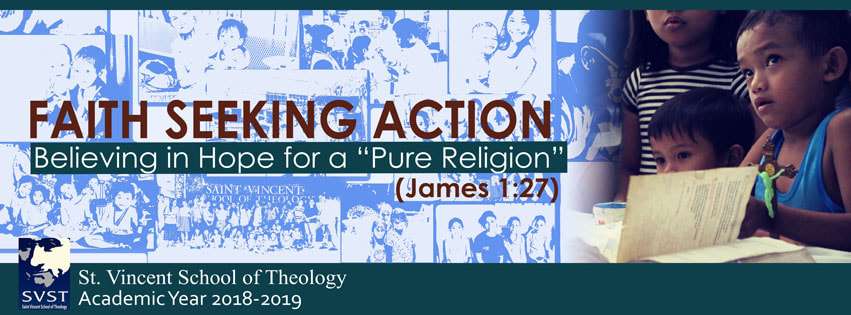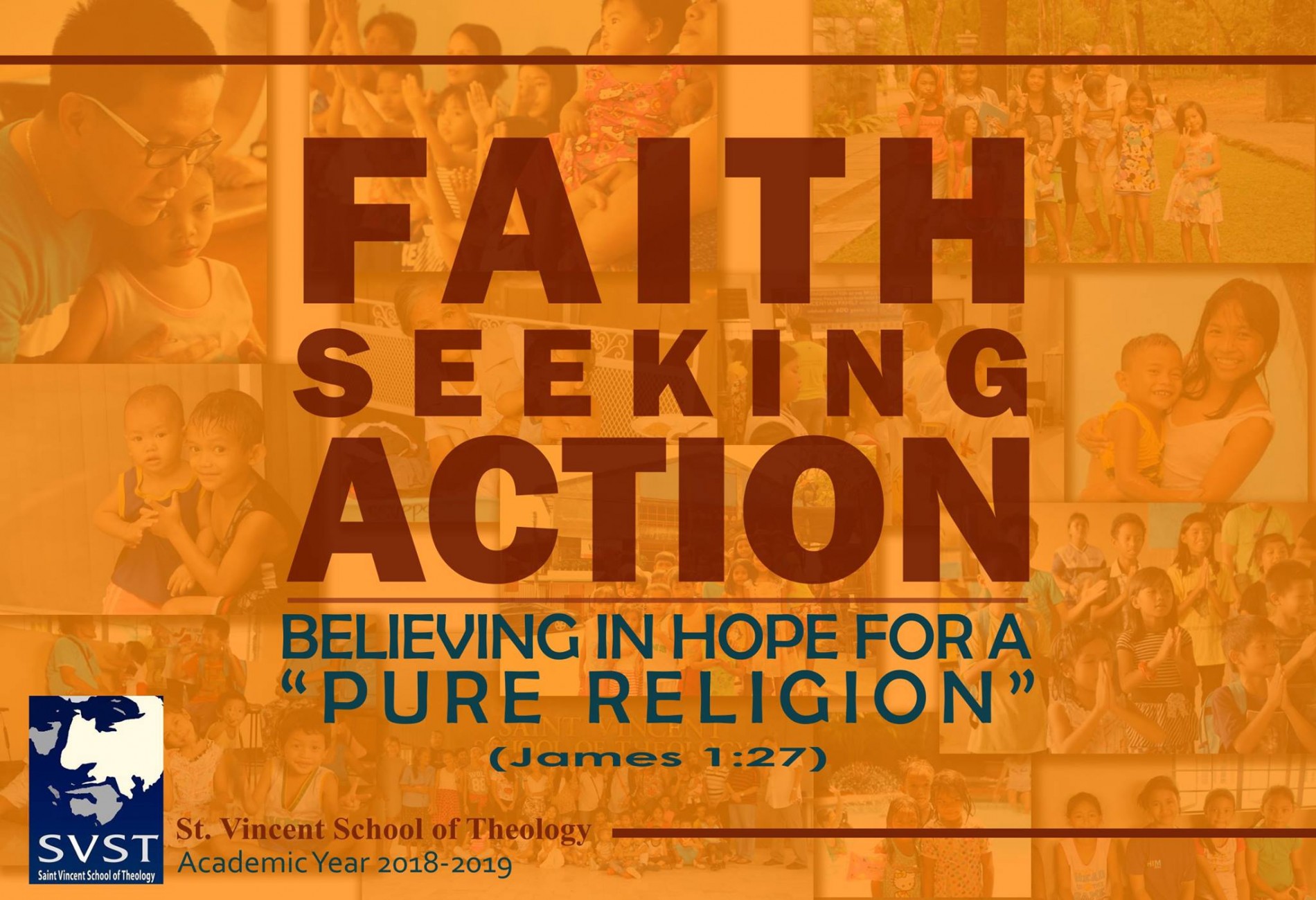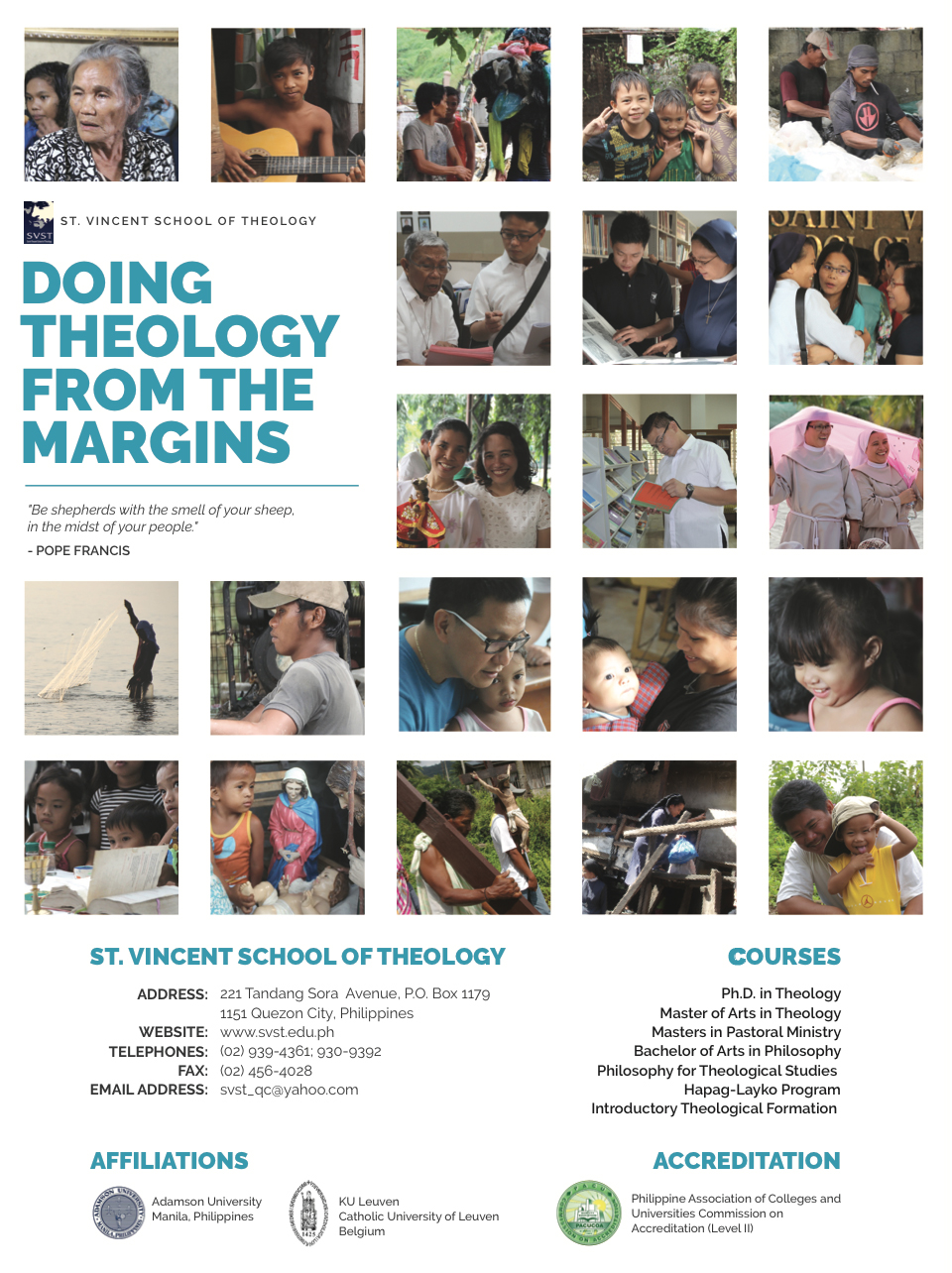Vision and Mission
St. Vincent School of Theology is an institute for the theological, pastoral and missiological formation of persons for effective service to the Church and society.
It fosters a way of doing theology that builds on the religious experience and praxis of the socially excluded, and gears towards the evangelization of the poor.
To achieve this vision, it offers a program of theological studies:
● inculturated and contextualized in Asia-Pacific/Philippine realities that seeks to be responsive to the vision and program of the local churches;
● marked by an inter-disciplinary character;
● that fosters critical-collaborative approach to theology, pastoral practice and mission;
● grounded classical sources and contemporary global developments
It endeavors to form a community of disciples whose theological knowledge, pastoral competence and missionary consciousness serve as catalysts towards ecclesial and social transformation.
More about SVST
A FRAGMENT OF HISTORY AND CONTEXT
Since their arrival in the Philippines in July 1862, the Vincentians totally dedicated themselves to the formation of the local diocesan clergy. On August 2, 1862—a mere eleven days after they set foot on the Islands— the Vincentians started to work in the new vineyard to which they were sent. Four Vincentian priests and brothers zealously set themselves to the task at hand by taking over the administration of Seminario Conciliar de San Carlos in Manila.
Read more . . .
DOING THEOLOGY FROM THE MARGINS
“Go to the peripheries!” Before he was elected Pope Francis, Jorge Cardinal Bergoglio gave this talk to the Cardinals gathered in conclave in March 2013: “There is a tension between the center and the periphery…. We must get out of ourselves and go toward the periphery. We must avoid the spiritual disease of the Church that can become self-absorbed. When this happens, the Church itself becomes sick…
Read more...
EXPANDING THE SVST VISION: GRADUATE THEOLOGICAL EDUCATION FROM THE MARGINS OF ASIA
I. Doing Theology from the Margins
In our effort to capture the spirit of the vision-mission, we formulated the motto: "doing theology from the margins". This direction is not far from the vision of Vincent de Paul, SVST's patron saint. We uphold the belief that theology does not come from the centers of power but from the experiences in the margins. And as theologians-in-process, students are trained to be sensitive to these voices from the rough grounds – voices most often excluded, muffled or suppressed.
Read More . . .
SVST Annual Themes
SVST ANNUAL THEMES
Pope Francis writes: “I want a Church which is poor and for the poor. They have much to teach us. Not only do they share in the sensus fidei, but in their difficulties they know the suffering Christ. We need to let ourselves be evangelized by them.” (Evangelii Gaudium, 198)
As we are taught by the poor, we also need to fight against the structures which marginalize them from society. Poverty is a scandal. It excludes people; it kills them and offers them in the altar of profit.
In this context we can understand Jesus’ command to his disciples: “You yourselves give them something to eat!” (Mk 6:37): it means working to eliminate the structural causes of poverty and to promote the integral development of the poor, as well as small daily acts of solidarity in meeting the real needs which we encounter” (EG, 187).
In order to give concrete direction to the motto “Doing Theology from the Margins”, SVST institutes its annual themes to guide our activities and pursue concrete directions toward the achievement of our thrust. It is formulated with a specific sensitivity to the movement of the Spirit in the Philippine and Asian churches and the lives of the grassroots communities.
WALKING WITH THE POOR: Theme for Academic Year 2023-2024
The guiding theme of bearing witness to and defending the Truth was the hallmark of the preceding academic year 2022-2023. It was especially steered by the thrust: ANGAT or "A Nation Guided and Accompanied by Truth". We then committed to embracing our collective duty of being guardians of the Truth against the current society's tragic rejection of the values of openness, sincerity, honesty, and accountability.
However, this pursuit of and defense of the Truth should be seen in an appropriate Christian context, especially in light of the numerous lies, cover-ups, and half-truths that have flourished wildly in various fields and sectors. Christ should be spread as the standard and path toward its accomplishment to ensure that the Truth we uphold is genuine and consistent with God's ideals. In accordance, Jesus identified himself as the Way, the Truth, and the Life (Jn. 14:6), suggesting that by accepting him as the Way, one can successfully come to the Truth and possess Life.
Providentially, Pope Francis will gather bishops worldwide in October 2023 for a Synod on Synodality. The term "synod" is derived from the combination of the Greek terms syn (“together") and hodos ("way"), which then literally means “being together on the way" or "walking together". In promoting long-term growth as a Church, this call encourages deeper involvement, communion, and mission among the faithful in witnessing the Gospel. In addition to accepting this appeal of the Holy Father, we at SVST append our communal bias of working for the evangelization and emancipation of the oppressed, the disadvantaged, and the marginalized in society, following the example of our patron, St. Vincent de Paul. In this regard, we pledge to carry out the thrust of "Walking with the Poor" for this year by being constantly aware of and in solidarity with the plight of the poor.
Fr. Rex Fortes, CM
St. Vincent School of Theology
Adamson University
LIVING IN HOPE, AFTER FIVE HUNDRED YEARS: Theme for Academic Year 2020-2021
One humid day, five hundred years ago, in one of the islands, later
called, the Philippines, a boat embarked loaded with a motley group of
adventurers, conquistadors, sailors, accompanied by a friar, after
months of sailing through the rough seas. While they were in that boat
(who knows, there were even rats in it !) of saints and sinners,
battered by nature’s harsh elements and occasional mutinies, there was
persistent hope not only to survive but also to flourish under God’s
providence.
With them came an icon of the Santo Niño, which in the context of their
ordinary religiosity, could have been their anchor of hope. The first
proclamation of the gospel was made at the first mass in these islands’
soil witnessed by the Child. At that first Mass (Latin and Tridentine),
emerged a vision of a new people that the Spirit would transform into
God’s chosen ones, enlightened by God’s word and nourished by Christ’s
Body. That was the “given” past and gratitude is a rightful response to
it for all its worth. So, they moved on as if in a dark sea but with
hope
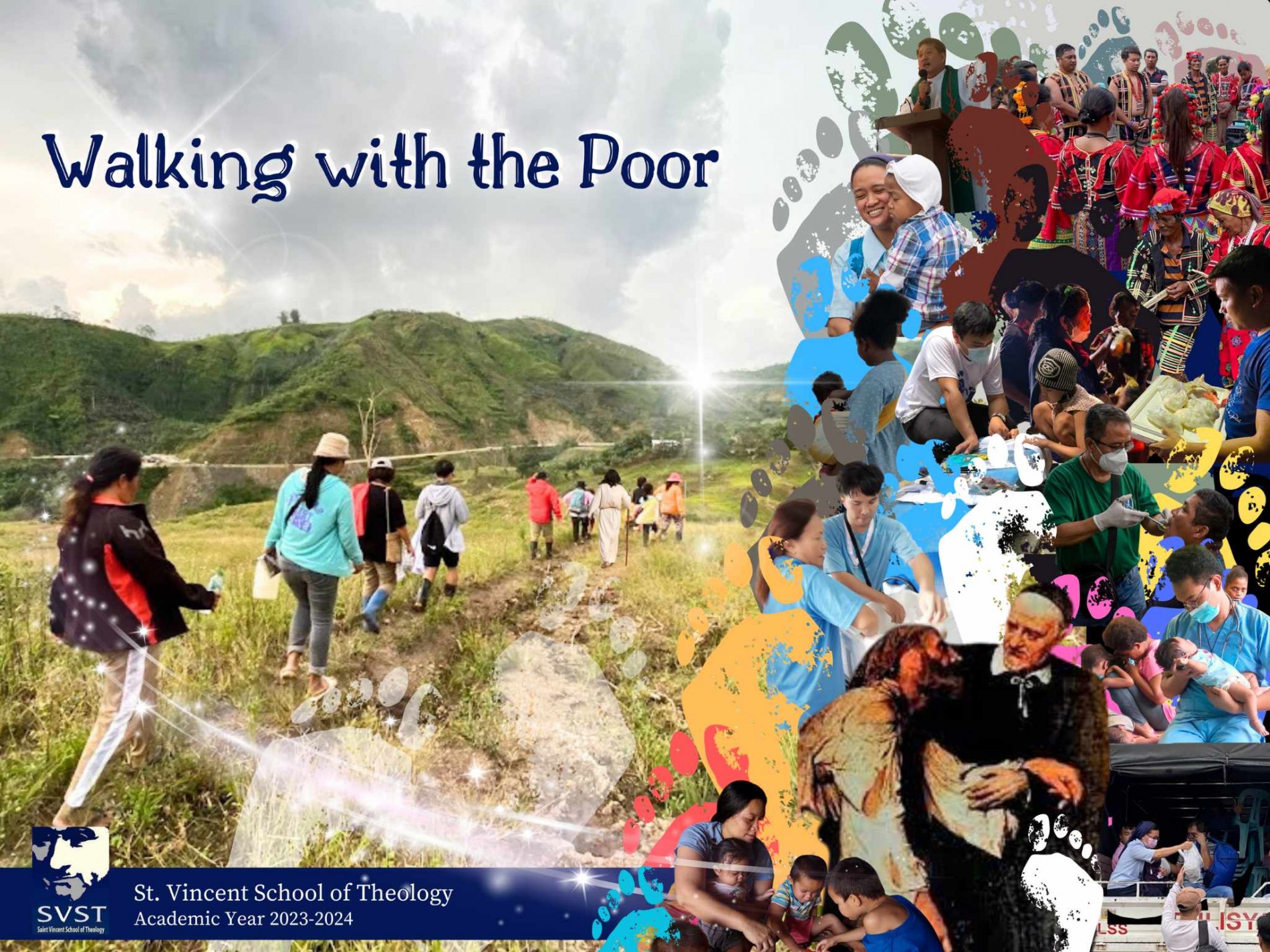
Five hundred years after that historic landing, we are in a similar boat, the Church, still loaded with saints and sinners, buffeted by the strong winds of socio-political adversities, economic inequalities and miseries and, last but not least, the scourge of the pandemic. Some feel more secure in the safer spots of the boat, others in more vulnerable sides.
*
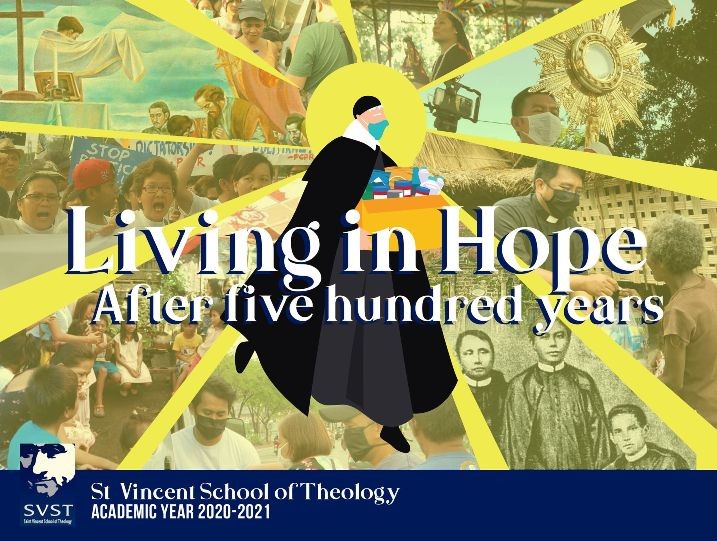
Was the hope for a transformed people realized today? It would be “no” if by transformation we mean a completed reality. But if by transformation we mean the ongoing journey towards a consummation that only the Lord can bring about, then, we can say “yes”. This boat still sails refusing to be disheartened by the turbulent sea because hope is in everybody’s heart. Because resurrected life has been found stronger than death, we’ve been assured of a future inheritance that no despot can take away and no pandemic can destroy; that’s Living in Hope!
Fr. Jimmy Belita, C.M.
St. Vincent School of Theology
Adamson University
September 25, 2020
THAT ALL MAYBE ONE... WITH THE VICTIMS: Theme for Academic Year 2019-2020
The theme for the academic year 2019-2020 is: “that they may be one . . . with the victims.” The formulation may strike some of you as odd, but it is really not as odd as you may think. It is rather a theme that brings together two sub-themes or topics. One is the idea of oneness or unity – the aspiration addressed in Jesus’ prayer for his disciples just before he underwent his passion and eventual death. And the second is the idea of being one with the victims. The two ideas interface in a beautiful and theological way.
Allow me to reflect on what this could mean.
“That they may be one”
As you well know, this passage is found in the Last Supper discourse recorded in the 17th chapter of John’s Gospel and locates Jesus few hours before he was handed over to his torturers. One may say that Jesus’ “dying aspiration” was that the disciples would remain one, united in their belief and faithfulness to Jesus’s message. Jesus knew all too well that this was a tall order, because not long after their last supper together the group of his disciples would disband, out of fear, cowardice, and betrayal. Yet, despite seeing signs of this division and separation, Jesus remained steadfast in his prayer that “they may be one.”
Since the Second Vatican Council this prayer has been employed to encapsulate the aspiration of many in divided Christendom, that “they may be one.” Ecumenism and interreligious dialogue were ideas that were meant to gradually bring about this Christian unity and mutual understanding and respect between persons of different religions. Fifty years since the end of that great Council, the aspiration “that all may be one” remains a tall order, because fear of each other, cowardice, inaction and timidity continue to rule our hearts. This is the case throughout the world, this is also the case here in the Philippines. The Church leaders in this country, as we prepare to celebrate the 500th anniversary of Christianity’s coming to these shores, have decided to pay special attention and set the focus in 2020 on ecumenical efforts and interreligious dialogue. As part of the Church, SVST is opting to join in these efforts and promises to explore other ways by which ecumenical and interreligious conversation could be promoted.
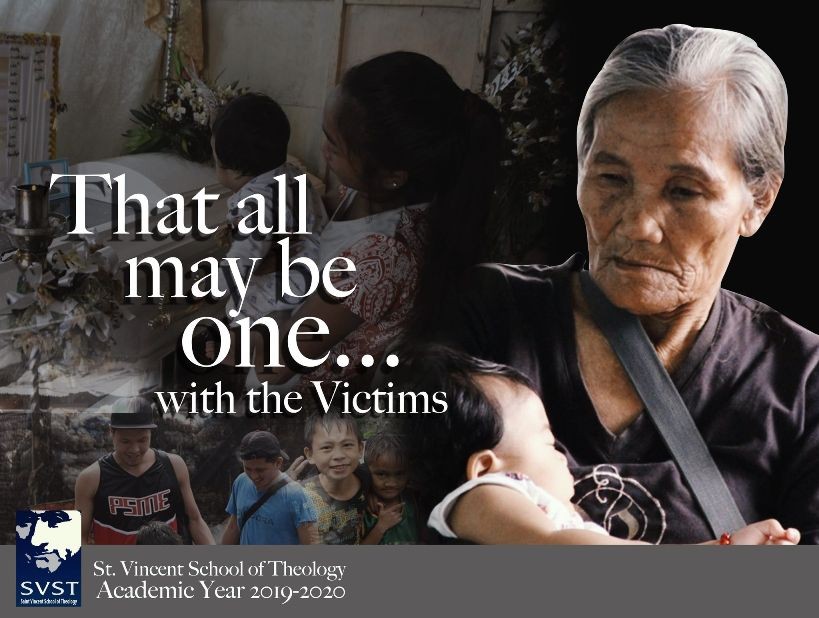
“That they may be one with the victims”
But as a Vincentian educational institution, SVST sees the prayer for unity and oneness not only as pertinent to matters on ecumenism and interreligious dialogue but also as opportune occasion to expand the circle of unity to include those in our midst who continue to be victims of violence and injustice. That is why we add the qualifier, “with the victims.” A prayer that does not include those in the margins of church and society, in the minds and hearts of SVST personnel, cannot be Jesus’ prayer nor of anyone who professes to be his follower. Necessarily, Jesus’ prayer, “that they may be one” includes those who are the very victims of the divisions that rack church and country today. And this, for a very simple reason.
The fuller text of Jesus’ prayer goes this way: “That they may be one as you, Father, are in me, and I in you, that they also may be in us, that the world may believe that you sent me.” (Jn 17:21).
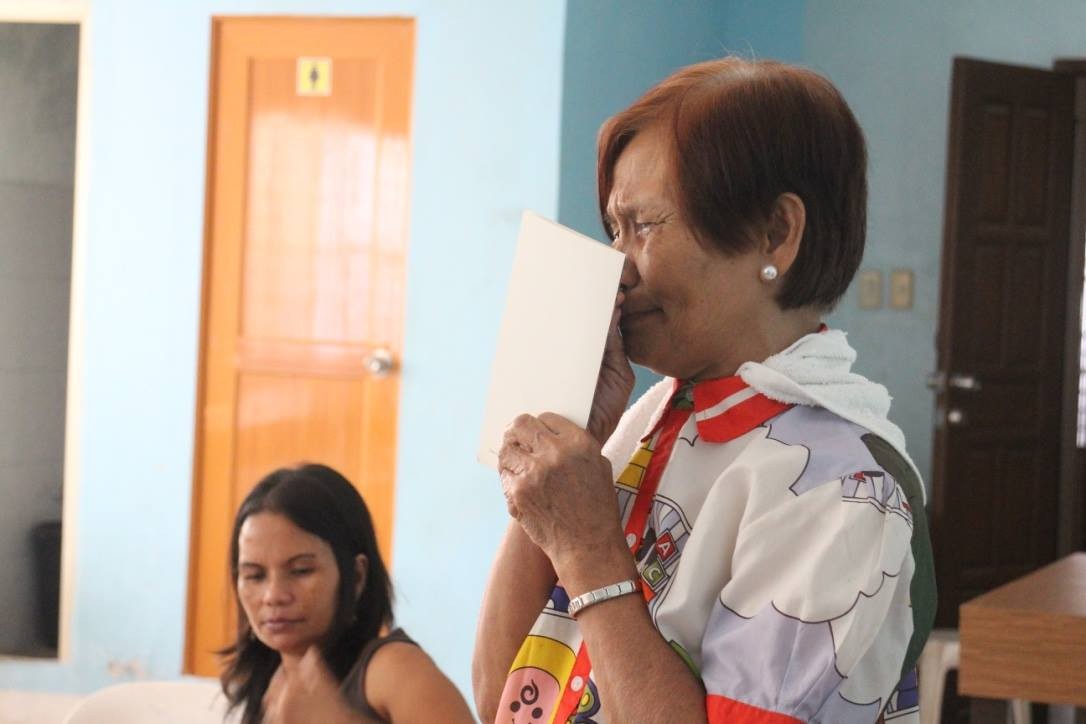
The unity that Jesus prays on behalf of his disciples is grounded on the unity that exists between Jesus and the Father. It is not some unity arrived at after some rounds of dialogue or as a product of compromise. It is a unity that seeks to embrace all – men and women, rich and poor, saint and sinner. But it is a unity that includes and gives ample room especially to those in most need – and who would be these but the victims of our own divisions, our own egoism and selfishness. Not as objects of our pity and graciousness, but as fellow actors and promoters of the unity that Jesus prays for. How many times have we heard Jesus precisely point out that those whom the world call “the little ones,” our “victims,” are the very ones who have much to give, to teach us, to contribute towards the unity of humankind. St. Vincent de Paul is of the same mind when he counseled us to heed the wisdom and compassion of the poor.
In our country and church today, there is a crying need to give room to the victim of violence and injustice, corruption and abuse of power. At the very least to listen to their aches and pains, their aspirations and longings. When we open our hearts and our minds to them, we allow the unitive, all-embracing love of God to embrace them. As we do so, we pave the way towards the unity that Jesus prays for when he says “that all may be one.”
Here are some questions for us to ponder this year as we try to implement the annual theme: Who are the victims? Why is there need for unity? For what do we need to be one?
Fr. Manny Ginete, CM
Rector
SVST
14 August 2019
FAITH SEEKING ACTION: BELIEVING IN HOPE FOR A “PURE RELIGION” (James 1:27) : Theme for School Year 2018-2019
In his letter to the Colossians (2:16-23), Paul seems to pit faith against religion. Those of us, hopefully, who still believe in religion, are curious about that religion being opposed to the faith. Paul actually refers to an impure religion which consists in superstitious prohibitions regarding the body, self-imposed worship, false humility, harsh treatment of the body, and putting no value in restraining sensual indulgence. Paul is correct in considering as impure a religion that views the body as evil. In the category of “impure” is a religion that is enforced by those in power in an attempt to maintain or abuse their power over others, designed only for the gain of its human creators. P. Yancey takes note of C.S. Lewis’ observation about crimes in Christian history coming about when “religion is confused with politics.” “Politics, which always runs by the rules of ungrace, allures us to trade away grace for power, a temptation the church has often been unable to resist.” A religion, associated with imperial Rome, which was used to justify its burden of taxation and control was an impure religion. This is covered by the Pauline opposition of true faith to impure religion.
So, where do we find this true and pure religion? Let us try the letter of James. “Pure and genuine religion in the sight of God the Father means caring for orphans and widows in their distress and refusing to let the world corrupt you” (1:27). This echoes a very strong warning from Exodus 22:, “You shall not mistreat any widow or fatherless child. If you do mistreat them, and they cry out to me, I will surely hear their cry” (21-22). These two verses seem mild enough and reasonable but let us hear from the two verses that immediately follow: “And my wrath will burn, and I will kill you with the sword, and your wives shall become widows and your children fatherless” (22-24). Had we not read straight from the bible, we would not have believed God would be that angry on the oppression against widows and orphans!
Why would James present the orphans and widows as persons in the pure and genuine religion? That was because they were the poorest of the poor, the defenseless; to oppress them, then, was to enjoy impunity. This is one of the sins, according to Catechism of the Catholic Church, that cry to heaven for justice, or, if you want it more strongly said, sins that cry to heaven for vengeance! (Cf. Dt 32:35)
James, in specifying the widows and the orphans, is only reflecting an advice from Jesus: “But when you give a banquet, invite the poor, the crippled, the lame, the blind, and you will be blessed. Although they cannot repay you, you will be repaid at the resurrection of the righteous” (Lk 14:13-14). This is summed up by a popular axiom: “Character is how you treat those who can do nothing for you.” Jesus warns us about having ulterior motives in relating to others, like using people for our own glory or the gratification of our own needs. First-century Christians would have us believe: “it will be the poor who will welcome us at the doors of heaven.” Will they know us well enough to let us in?
If we go back to Colossians, then, yes, true faith is against religion if this religion proves itself to be impure. In the same vein, faith that is alive is pure religion. The book of James, according to an evangelical preacher, is all about “Hands-on Christianity”. There is no opposition between faith and good works, after all, good works are the results of true faith. James cannot be more explicit in his statement, “Faith without good works is dead” (2:17). If Christianity is a crime and you will be tried, how would you get acquittal? Simple, if it can be proven that your faith is dead because you are a Christian in name only. How can you be convicted of being a Christian? Easy, if you show evidences of good works that flow from your faith.
There is a well-known person, to cite an example, convicted of being a Christian; her name is Mother Theresa. This is her statement: “Jesus has said ‘come blessed of my Father, take the seat in the kingdom prepared for you, because I was hungry you gave me food. I was thirsty you have me drink. I was naked you clothed me. I was homeless you took me home and I was sick you visited me. ‘And we are just doing that."
How about you? Can you be convicted of being a Christian? Or put in another way? If Christianity is a crime, would you be found guilty? Yes, you would be, if a witness comes along, let’s say, a poor widow, who testifies to the court for you by her statement that she was hungry and thirsty and you came along to give her something to eat and drink. Yes, in a world with an ungodly system, you are a convict, but in the Father’s kingdom, you will be called God’s child and heir of the Kingdom and your reward will be great in heaven. So is true what the early Christians said that it will be the poor who will receive you at heaven’s gate. And as Rev. J. Forbes said: “Nobody gets into heaven without a letter of reference from the poor.” Why so? “For theirs is the kingdom of heaven!”
Fr. Jimmy Belita, C.M.
St. Vincent School of Theology
Adamson University
August 2019
